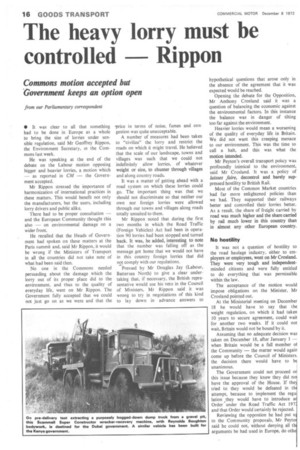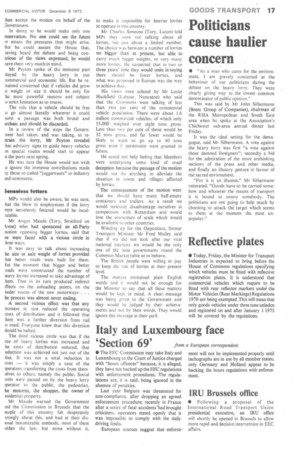The heavy lorry must be controlled Rippon
Page 18

Page 19

If you've noticed an error in this article please click here to report it so we can fix it.
Commons motion accepted but Government keeps an option open
from our Parliamentary correspondent • It was clear to all that something had to be done in Europe as a whole to bring the size of lorries under sensible regulation, said Mr Geoffrey Rippon, the Environment Secretary, in the Commons last week.
He was speaking at the end of the debate on the Labour motion opposing bigger and heavier lorries, a motion which — as reported in CM — the Government accepted.
Mr Rippon stressed the importance of harmonization of international practices in these matters. This would benefit not only the manufacturers, but the users, including lorry drivers and public alike.
There had to be proper consultation — and the European Community thought this also — on environmental damage on a wider front.
He recalled that the Heads of Government had spoken on these matters at the Paris summit and, said Mr Rippon, it would be wrong if the Ministers of Transport in all the countries did not take note of what had been said then.
No one in the Commons needed persuading about the damage which the lorry out of its proper place did to the environment, and thus to the quality of everyday life, went on Mr Rippon. The Government fully accepted that we could not just go on as we were and that the -price in terms of noise, fumes and congestion was quite unacceptable.
A number of measures had been taken to "civilize" the lorry and restrict the roads on which it might travel. He believed that the scale of our landscape, towns and villages was such that we could not indefinitely allow lorries, of whatever weight or size, to chunter through villages and along country roads.
It was a matter of getting ahead with a road system on which these lorries could go. The important thing was that we should not discriminate so that neither our own nor foreign lorries were allowed through our towns and villages along roads totally unsuited to them.
Mr Rippon noted that during the first two months in which the Road Traffic (Foreign Vehicles) Act had been in operation 90 lorries had been stopped and turned back. It was, he added, interesting to note that the number was falling off as the message got home that we would not have in this country foreign lorries that did not comply with our regulations.
Pressed by Mr Douglas Jay (Labour, Battersea North) to give a clear undertaking that, if necessary, the British representative would use his veto in the Council of Ministers, Mr Rippon said it was wrong to try in negotiations of this kind to lay down in advance answers to hypothetical questions that arose only in the absence of the agreement that it was expected would be reached.
Opening the debate for the Opposition, Mr Anthony Crosland said it was a question of balancing the economic against the environmental factors. In this instance the balance was in danger of tilting too far against the environment.
Heavier lorries would mean a worsening of the quality of everyday life in Britain. We did not want this creeping menace to our environment. This was the time to call a halt, and this was what the motion intended.
Mr Peyton's overall transport policy was profoundly inimical to the environment, said Mr Crosland. It was a policy of laissez faire, decontrol and barely suppressed hostility to British Rail.
Most of the Common Market countries had far more enlightened policies than we had. They supported their railways better and controlled their lorries better. As a result, the share of freight carried by road was much higher and the share carried by rail much lower in this country than in almost any other European country.
No hostility
It was not a question of hostility to the road haulage industry, either to employers or employees, went on Mr Crosland. They were very tough and independentminded citizens and were fully entitled to do everything that was permissible within the law.
The acceptance of the motion would impose obligations on the Minister, Mr Crosland pointed out.
At the Ministerial meeting on December 18 he would have to say that the weight regulation, on which it had taken 10 years to secure agreement, could wait for another two weeks. If it could not wait, Britain would not be bound by it.
Assuming that no adequate decision was taken on December 18, after January 1 — when Britain would be a full member of the Community — the matter would again come up before the 'Council of Ministers the decision there would have to bc unanimous.
The Government could not proceed o this issue because they knew they did no have the approval of the House. If the tried to they would be defeated in th attempt, because to implement the regu lation they would have to introduce Order under the Road Traffic Act 197 and that Order would certainly be rejected.
Reviewing the oppostion he had put u to the Community proposals, Mr Peyto said he could not, without denying all th arguments he had used in Europe, do othe than accept the motion on behalf of the Government.
In doing so he would make only one reservation. No one could see the future Dr assess the pressures that might arise. But he could assure the House that, 3aving heard the debate and being con;cious of the views expressed, he would lave them very much in mind.
Mr Peyton spoke of the immense part 7layed by the heavy lorry in our :ommercial and economic life. But he renained concerned that if vehicles did grown weight or size it should be only for .he most powerful reasons and subject .o strict limitation as to routes.
The rule that a vehicle should be free .o go almost literally wherever it could )urst a passage was both brutal and irchaic and should be discarded.
In a review of the steps the Government had taken, and was taking, to re;train the lorry, Mr Peyton revealed hat advisory signs to guide heavy vehicles
m special routes would start to appear
n the ports next spring.
He was sure the House would not wish .o ignore the immense contributions made )3r these so-called "juggernauts" to industry tnd commerce.
;eriseless fetters
MPs would also be aware, he was sure, hat the blow to employment if the lorry were senselessly fettered would be incalmlable.
Mr Angus Maude (Tory, Stratford on kvon) who had sponsored an all-Party notion opposing bigger lorries, said that ve were faced with a vicious circle in lute ways.
It was easy to talk about increasing he size or axle weight of lorries provided .hat better roads were built for them. 3ut the moment that bigger and better -oads were constructed the number of teavy lorries increased to take advantage of hem. That in its turn produced indirect ;ffects on the unloading points, on the 'eeder routes of the new motorways . . he process was almost never ending.
A second vicious effect was that any ncrease in size reduced the operating :osts of distribution and it followed that .here was a further diversion from rail :o road. Everyone knew that this diversion ;hould be halted.
The third vicious circle was that if the ;ize of heavy lorries was increased and he costs of distribution reduced, that .eduction was achieved not just out of the alue. It was not a total reduction in :osts — it was simply a case of the verators transferring the costs from them;elves to others, namely the public. Social :osts were passed on by the heavy lorry perator to the public, the pedestrian, he motorist, the shopper, the owner of esidential property.
Mr Maude warned the Government ind the Commission in Brussels that the ieople of this country felt desperately trongly about this, and had at their dis)osal innumerable methods, most of them vithin the law, but some without it, to make it impossible for heavier lorries to operate in this country.
Mr Charles Simeons (Tory, Luton) told MPs they were not talking about all lorries, hut just about a limited number. The choice was between a number of lorries no bigger than at present, but able to carry much bigger weights, or very many more lorries. He suspected that in two or three years' time they would unite in saying there should be fewer lorries, and what was proposed in Europe was the way to achieve that.
His views were echoed by Mr Leslie Huckfield (Labour, Nuneaton) who said that the Commons were talking of less than two per cent of the commercial vehicle population. There were about 1.6 million commercial vehicles, of which only 55,000 weighed over eight tons gross. Less than two per cent of those would be 32 tons gross. and far fewer would be likely to want to go up to 40 tons gross even if permission were granted in future.
He could not help feeling that Members were undergoing some kind of cruel deception because the passage of the motion would not do anything to alleviate the situation in towns and villages affected by lorries.
The consequences of the motion were that we should have many half-empty containers and trailers. As a result we would seriously disadvantage ourselves in . competition with Rotterdam and would lose the economies of scale which would be available 10 other countries.
Winding up for the Opposition, former Transport Minister Mr Fred Mulley said that if we did not look after our vital national interests we would be the only one of the nine governments round the Common Market table so to behave.
The British people were willing to pay to keep the size of lorries at their present level.
The motion contained plain English words and it would not be enough for the Minister to say that all these matters would be kept in mind. A clear, message was being given to the Government and they would be judged by their achievements and not by their words. They would ignore this message at their peril.








































































































